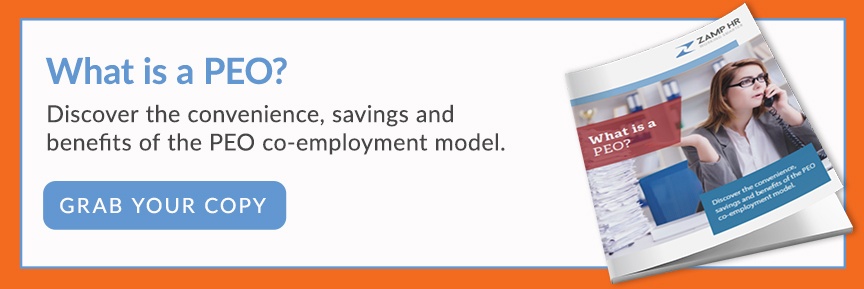You know you have too much work to do. HR is a complex and often time-consuming job that, depending on the size of your company, may require multiple heads. Your boss may even know it, too, but all they seem to care about is cutting costs. So they will not let you hire another employee.
However, knowing that your boss may have different incentives than you can be an advantage. You know exactly what they want - low overhead, cost savings, and efficient work.
Your answer is HR outsourcing with a Professional Employer Organization (PEO). By making a strong business case for outsourcing some HR duties, you can persuade your boss that this is the right move for your company to make.
Business Case vs. Business Plan
To get your manager to approve your request to outsource HR duties, you need to convince them this is the right decision at the right time. While the reason to partner with a PEO might seem obvious to you, it might not be to your manager, so you need to lay the benefits out clearly for them and present a strong business case.
A good business case will show what happens if your company partners with a PEO by inspecting the pros and cons. This will include what the PEO partnership will cost your company and what benefits your company will receive. Be specific and detailed, showing your boss the value that a PEO can bring by providing a high ROI.
Do not confuse a business case with a business plan, however. A business plan is a set of goals and strategies that your company wants to achieve. Conversely, a business case will attempt to convince your manager of the value of partnering with a PEO.
How to Justify HR Outsourcing
To make a compelling business case for partnering with a PEO, a substantial portion of your presentation will center on justifying the outsourcing of certain HR tasks. Your boss will probably ask many questions such as why the internal HR team cannot handle all of the existing work. Anticipating the questions you will receive can help persuade your boss.
Find out what your employer's priorities are
Your boss has different priorities than you. They are usually getting pressure to keep costs down and employees efficient. This can help your company grow by reinvesting profits into sales and growth opportunities.
You can make the case that outsourcing certain mundane and complex HR tasks can make your internal team more productive. A PEO seeks to complement your internal team by handling difficult tasks like payroll and tax remittance, tasks that often require a keen eye for detail and multiple experts. This frees up your internal team to focus on your company's core business needs, helping achieve the growth your business wants.
Growth-related
Your company may have aggressive growth plans. Hiring one team member at a time can prevent scalable growth. Each new hire comes with high costs and time commitment from existing employees.
With a PEO, you essentially hire multiple HR experts at once but for a much lower cost. Hiring one employee restricts your company's access to knowledge. If that employee is out sick and they are responsible for running payroll, you may not have a plan for that important task to get done.
Your PEO has multiple HR experts on staff. If one person is out, there are more payroll experts who can step in and run your payroll accurately. Partnering with a PEO makes scaling your company's HR abilities a breeze.
The annual median revenue growth for companies that partner with a PEO was double companies that do not use a PEO. If your boss is looking for growth opportunities, they need look no further than a PEO.
But that's not the only benefit. A PEO can also improve employee engagement. This metric is vital to your company's growth and success. By keeping employees engaged, they remain loyal to the organization, are more likely to be effective in their roles, and less likely to leave. Reducing turnover contributes to growth by limiting the costly process of replacing employees.
Cost-savings
Your manager also seeks to reduce costs. Any business case you make must include a clear and detailed explanation of how outsourcing HR will reduce the company's overall costs.
Benefits are often a cost drain, especially for small businesses. Offering high-quality and affordable benefits can be cost-prohibitive. With a PEO, your company gains access to the PEOs benefit offering, providing your employees with access to quality options at costs they can afford.
Your company may also see a reduction in workers' compensation costs. By partnering with a PEO, your company can access the PEOs workers' comp insurance plan, which might have a lower premium than what your business could get on its own.
Employees want benefits besides healthcare and that includes retirement options. But many small businesses simply cannot afford to offer them. With a PEO, retirement plans can become part of your company's benefits package as you may find a reduction in the administration fees.
A PEO Provides Your Best Option
Making a strong business case to your boss is crucial to your company's growth and success with a PEO. You need to make a compelling and persuasive case justifying why you want to pursue this option.
Partnering with the right PEO gives your company the best solution by reducing costs and increasing employee productivity.
The choice is simple.



